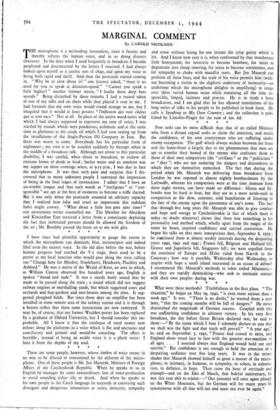I have since had plentiful opportunity to gauge the extent
to which the microphone can diminish, blur, misinterpret and indeed libel even the neatest voice. In the old days before the war, before human progress had reached the V.2 stage, there used to be a porter at my local junction who would pass along the train calling out "Change here for Marden, Staplehurst, Headcorn, Pluckley and Ashford." He was a native of the Weald of Kent, an area in which, as William Caxton observed five hundred years ago, English is spoken " broad and rude." It was a sturdy burly sound that he made as he passed along the train ; a sound which did not suggest railway engines or marshalling yards, but which suggested cows and orchards and hop-gardens and oast-houses among the elms. It sug- gested ploughed fields. But since those days an amplifier has been installed in some remote area of the railway station and it is through a brazen orifice that these same instructions are now conveyed. It may be, of course, that my former Wealden porter has been replaced by a graduate of Oxford University, but I should consider this im- probable. All I know is that the catalogue of rural names now echoes along the platforms in a voice which is flat and unctuous and conciliatory and genteel and would-be consoling. The effect is horrible ; instead of being an arable voice it is a plush voice: I hate it from the depths of my soul. * * * *


























 Previous page
Previous page